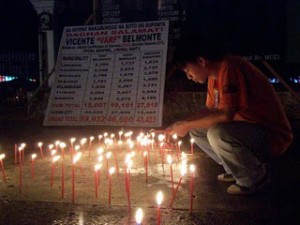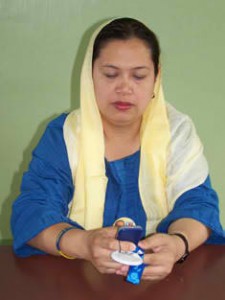By VIOLETA M. GLORIA
MindaNews

ILIGAN CITY.—Everyone is on heightened alert in Lanao del Norte, where a longstanding political dispute involving the warlord Dimaporo clan has come to a head in recent months.
The flashpoint is Pantao Ragat, a fifth-class town an hour and a half from here and bordering Lanao del Sur. Pantao Ragat is ruled by the husband-and-wife team of Lacson and Eleanor Lantud, whom the Dimaporos have been trying to unseat.
Pantao Ragat Mayor Eleanor Dimaporo Lantud is a first cousin of Rep. Abdullah Dimaporo and niece of Mindanao’s original warlord, the late Muhammad Ali Dimaporo.
She became mayor in 2007, replacing her husband who slid to vice mayor after serving three terms. On his mother’s side, Lacson is related to Abdullah Mangotara, a gubernatorial rival of Dimaporo in the 1990s.
Efforts to reconcile the Lantuds with the Dimaporos have proved futile, even if Eleanor is a blood relative. Their rivalry has lasted two decades, as a result of which Pantao Ragat is today the only town in Lanao not ruled by a Dimaporo ally. All 21 other towns in the province are controlled by Dimaporo’s Lakas-Kampi-CMD partymates. The Lantuds are affiliated with the Liberal Party.
Last March, an armed group identified with a rival mayoral candidate went to Pantao Ragat to meet with another group that has a standing political rido (feud) with the Lantud family.
Vice Mayor Lantud was said to have immediately tipped the military about the presence of these men.
“Military-police teams were on patrol to validate reports on the presence of armed men but were, however, fired upon by the armed group. A security officer was killed during the clash,” said Adona Orquillas, a human rights advocate and member of the local monitoring team (LMT) of the government’s peace panel representing civil society.
While the encounter was going on, Orquillas said, military officials received a call from Congressman Dimaporo asking for a ceasefire “because they are my men.” Orquillas said “soldiers told Dimaporo that they were on field to enforce the policy on gun ban.”
Dimaporo, however, denied this in an interview over local radio station DXIC, saying he was not responsible for the presence of armed men at Pantao Ragat.
The encounter prompted Col. Cresente M. Ferrer, commanding officer of the Army’s 601st Infantry Brigade, to dispatch the 43rd Infantry Battalion to Pantao Ragat “to control the situation and to ensure that armed confrontation will not happen again between rival candidates, as well as to protect civilians.”
The heightened tension here began in December when Dimaporo wanted Pantao Ragat placed under martial law for the same reason that President Gloria Arroyo imposed martial law in Maguindanao, where the Ampatuans gunned down 57 people, more than half of them reporters. Dimaporo said residents feared for their lives because the Lantuds maintained a private army.
In early January, the Lantuds’ political rivals, reportedly backed by the Dimaporos, attempted to disqualify them from running again by accusing them of maintaining an armed group of about 200 persons.
And then on Jan. 21, the provincial council placed Vice Mayor Lantud on a 60-day preventive suspension for grave misconduct and abuse of authority.
On Feb. 10, Lantud in turn sued Dimaporo’s son, Gov. Mohamad Khalid Quibranza Dimaporo, acting provincial administrator Joselito Quibranza, police provincial director Superintendent Orlando Benas, and the company commander of the provincial public safety management company. He said these officials violated election laws by suspending him during the election period.

Khalid, who is seeking re-election, is the son of Abdullah and Imelda Dimaporo. Imelda is running as representative of Lanao del Norte’s first district.
Abdullah, who has served three terms as second district representative, is seeking to bequeath his post to his daughter, Fatimah Aliah.
Violent incidents, however, are not limited to Pantao Ragat. Election supervisor Hamilton Cuevas of the provincial Commission on Elections said more than half of the province’s 22 towns are considered “hot spots” because of the possibility of election-related violence.
The last elections here were characterized by violence. In 2007, armed men disrupted the electoral process in Maigo town. They barged into the precincts and poured indelible ink over ballot boxes, prompting voters to flee in terror.
Tampering of certificates of canvass in the Maigo, Kauswagan and Bacolod towns, meanwhile, delayed the declaration of the winning congressional candidate for the first district. The conflict escalated and reached the Supreme Court. The three towns are supposed bailiwicks of opponents of the Dimaporos.
People here attribute to a group called Lawyers-for-Truth and the continued rallying and candle lighting of people on the streets the eventual victory of Vicente Belmonte who was declared representative for the district. Belmonte managed to get Iligan City declared as a congressional district, separate from the first district of Lanao del Norte where it used to belong.
Amid the potential violence and the growing concerns over the automated election, stakeholders for free, honest and credible elections in Lanao del Norte and Iligan are waging a campaign to ensure that the election will be conducted peacefully here.
The military, Comelec, religious leaders and civil society agreed on a Covenant of Hope as an expression of their commitment to work for “credible, honest, orderly and peaceful election” and “remain vigilant and responsive to the needs of the voters at all times.”

Maj. Dennis Cuaresma, civil-military officer of the 601st Infantry Brigade, said 24 peace covenants have been signed by candidates from Iligan City and the 22 towns of Lanao del Norte.
But Jayshree Boot, gender advisor of Civil Society Organizaton Forum for Peace (CSOFP), pointed out that since the covenants are voluntary and not legally binding, they cannot be used to press for criminal sanctions in case candidates resort to violent means to win.
Cuaresma said the covenants may indeed be ignored, citing the encounter in Pantao Ragat that killed one police officer.
Aside from the rivalry among politicians, another source of violence is the government’s war against Muslim rebels. In the morning of April 17, a platoon of soldiers from the 35th Infantry Brigade clashed with alleged members of the Moro Islamic Liberation Front (MILF) in Barangay Payong in Sultan Naga Dimaporo. The incident displaced residents.
Payong is one of the town’s 37 barangays, a large number of which are in the hinterland zones bordering the neighboring town of Sultan Gumander and two towns of Zamboanga del Sur. Most kidnap victims from Lanao and Zambonga, local and foreign, are brought here.
Ferrer reported that there were about 40 “lawless” members of the MILF in dark fatigue clothes aboard two speed boats that docked on the shores of Payong and were believed responsible for kidnapping Nena Toremocha, 62, a businesswoman and wife of Alfredo Toremocha, former mayor of Mabuhay, Zamboanga Sibugay.
Toremocha was seized in the afternoon of April 12 in Mabuhay town, with her captors reportedly demanding a P30-million ransom. An encounter between kidnappers and government troops sent to the area left one soldier wounded.
Ferrer said the kidnap victim was abandoned two kilometers from the site of the encounter and was recovered by police forces from Region IX. He had no information if ransom was paid.
Through all this, civil society organizations see the need for increased vigilance. Said Jane Bernardo, chair of the Civil Society Organizations-Forum for Peace (CSOFP): “Civil society groups have developed an information mechanism to validate reports from the community so that we can assess the situation clearly and respond appropriately.”
Bernardo has called on the community to monitor the conduct of the elections.
“We need to intensify our campaign for peaceful election by discouraging social structures that promote the relationship of politics and armaments,” she said. “We appeal to candidates to stop using Muslim and Christian biases in the campaign because we intend to maintain social cohesion and peaceful co-existence.”
Darwin Manubag, peace educator of Mindanao State University-IIT campus, said that although eight rounds of voters’ education for peace had been conducted along with civil society, there remains a need to exhaust all avenues so that people will vote on the basis of social agenda and not money.
The CSOFP, Parish Pastoral Council for Responsible Voting, MSU-IIT’s Institute for Peace and Development (IPDM), and Project HOPE have conducted three voters’ education and forum for candidates on May 3 “to provide a platform where people from hinterland and coastal communities can raise their questions to candidates relating to social services, infrastructure, environment, sectoral representation, peace process, and the party agenda of political groups.”
Fr. Albert Mendez of the Social Action Center of the Diocese of Iligan and head of the local PPCRV, shared with voters the standards of the church in choosing leaders who must be imbued with a “sense of religiosity, expertise or competence, integrity and moral obligation to take the preferential option of serving the poor at all times.”
